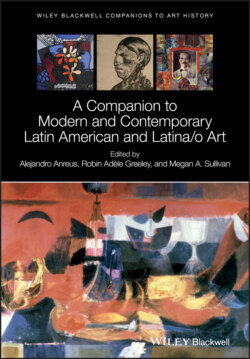Читать книгу A Companion to Modern and Contemporary Latin American and Latina/o Art - Группа авторов - Страница 39
3 José Carlos Mariátegui and the Eternal Dawn of Revolution
ОглавлениеMartín Oyata
*
* *
José Carlos Mariátegui (1894–1930) is the great unknown in Latin American intellectual history. Widely regarded as one of the continent's finest thinkers, his ideas nonetheless prove hard to grasp, as they resist those pithy formulas that make for accessible surveys. Whereas Domingo Faustino Sarmiento is remembered for the dichotomy “civilization or barbarism,” José Enrique Rodó for his odes to the Latin spirit, and José Vasconcelos for his theory of the “cosmic race,” Mariátegui seems a more elusive, if not esoteric, thinker.
Standard accounts resort to the established facts of his biography. Thus we are typically told that he was born in Peru, was a self‐taught intellectual, founded the Peruvian Socialist Party, launched one of the foremost avant‐garde reviews of the continent – the legendary Amauta – and died quite young, at the age of 35. We are also told that he devoted much of his efforts to writing about modern art, arguing for the compatibility of Marxism and nationalism, and, above all, calling for an indigenist understanding of Marxism. But what does this amount to? What, if anything, ties these strands together?
The first thing to note is that Mariátegui was fundamentally a man of letters and a man of his times. His friend, the eminent historian Jorge Basadre, once described him as a journalist, a remark that, although perhaps condescending, is not in fact unfair. For Mariátegui's oeuvre is almost entirely composed of short articles, occasional pieces of writing that allowed him to perfect a vigorous and attractively readable style (and make a living as well), but can seem too episodic and too dependent on current affairs for the present‐day reader. Even his more organic book, Siete ensayos de interpretación de la realidad peruana (Seven Interpretive Essays on Peruvian Reality, 1926), lacks any grand design. But such fragmentariness does not result exclusively from the pressing conditions under which Mariátegui – always up against the clock – forged his ideas; it is the mode of thought that he consciously favored and proudly embraced, as the Nietzsche epigraph with which Seven Essays begins makes sufficiently clear: “I intend never again to read an author of whom it is apparent that he wanted to produce a book: but only those whose thoughts unintentionally became a book” (Nietzsche 1986, p. 339). Nothing was more alien to Mariátegui's mind than the desire for building systems or prescribing methods.
This rejection of stuffy academicism comes through especially strongly in his writings on artistic matters. Not only did Mariátegui favor commentary on particular works and artists instead of well‐rounded aesthetic theories, but he also discussed literature and painting, or sculpture and film, as if there were no formal or methodological distinctions to be made between those realms. It would be unwise to give the impression, however, that he was unaware of those boundaries; the point, rather, is that he regarded all those manifestations as indexes of something larger. Mariátegui's ambition was to chart the culture of his times. What mattered to him was the epoch: a complex array of objective and subjective conditions that, by configuring a social structure of consciousness, give each historical period a unique personality.
